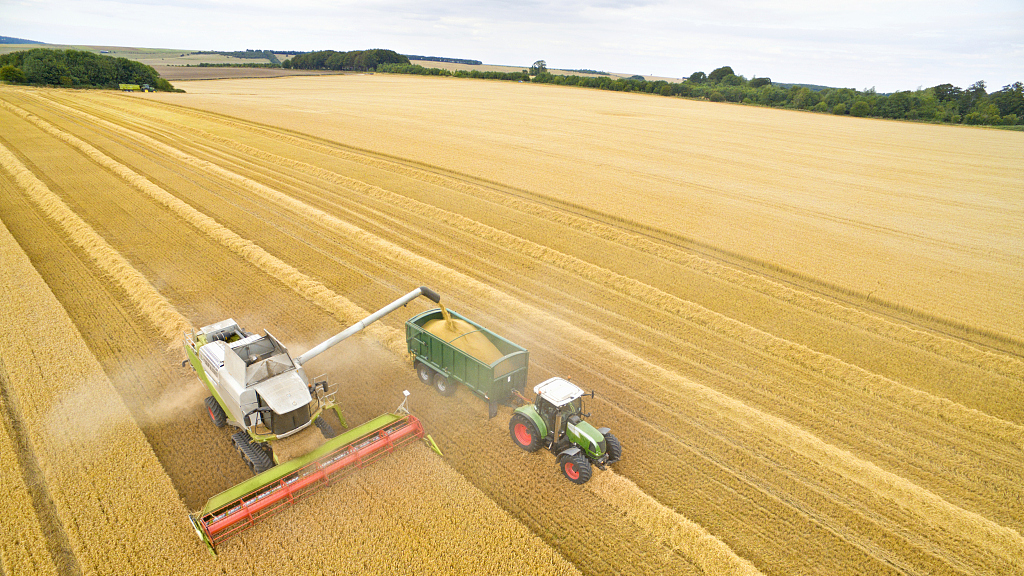
Editor's note: Barry He is a London-based freelance columnist. The article reflects the author's opinions, and not necessarily the views of CGTN.
Food self-sufficiency and security are increasingly pressing priorities for China. Chinese President Xi Jinping has recently highlighted concerns over China's growing food waste habit in a national address and has called for greater investment in food security technologies to feed the country's huge population.
The domestication of Oryza sativa, otherwise known as rice, several thousand years ago was a huge technological breakthrough in ensuring ever-growing populations could maintain the privilege of a full stomach. Now, research into seed technologies and genetic modification will mean that sustaining a population of well over one billion will be done easier than ever before. Regulating it efficiently is another feat in itself.
Plans to invest in agricultural scientific research with seed tech and genetically modified (GM) crops in particular were outlined well over 10 years ago. In the State Council's "National Medium and Long-term Scientific and Technological Development plan 2006 - 2020," frameworks were laid out for heavy investment.
Earlier in December, policymakers at China's Central Economic Work Conference said a pivotal area is seed technology. As well as increasing yield through faster growth rates and resistance against diseases, crops benefiting from seed technology could also allow farmers to dynamically respond to climate change in the coming years. Crops that can tolerate heat, drought and flooding are heavily sought after.
For example, the common bean, a product that millions rely on, loses its yield when nighttime temperatures rise above 20 degrees Celsius. When a yield cannot keep up with demand, there are serious consequences that are not limited to less rice in supermarkets. Seeds make up over 70 percent of the food people consume directly and indirectly produce many of the other foods we eat. The meat, dairy and egg industries, for example, all rely upon seeds to feed their livestock. Clothing fibers, such as hemp, linen and cotton, are also an important part of the conversation, even if their production does not directly impact our stomachs. A failing yield would lead to the collapse of numerous industries with far-reaching consequences.

Seed technologies, involving careful, selective breeding and precise monitoring, are modern versions of methods that have been carried out for thousands of years in Chinese history. However, some tenets remain universal throughout time, for example, favoring plants with high yields, discarding those that do not and repeating this process for countless generations. Now, technology can store this hard-earned knowledge, with scientists and farmers able to draw from it when needed.
Calls to upgrade both China's infrastructure for storing plant genetic material in cryo chambers and GM research in general abound and have also been emphasized by many in the industry. Numerous discoveries related to improving seed yields and resistance against pests stem from tinkering with their genetic content retrospectively, with innovative and valuable techniques being carried out on older seed strains stored in cryo chambers. These seed banks may be thought of as a large living museum of stored seeds in stasis, ready to be analyzed.
This has especially been the case with soybeans, which have a long history of domestic industry in China and are the subject of numerous genetic engineering experiments. Zhang Xin, an analyst from the GLOCON Agritech Co-Innovation Institute, said in a statement that "the tone about GM technology seems to be changing. It is now about how big its impact will be on grain security."
The agricultural ministry this year granted safety licenses to genetically modify several variants of soybean and a type of corn, the biggest legislative change in over 10 years. This legislation is being introduced at a time where it could not be more welcome. Pest resistance is becoming increasingly important. In the last few years, the seemingly unstoppable spread of the notorious fall armyworm from Africa in 2018 to India and now China has decimated the livelihoods of farmers around the world. The natural distribution of this species, exacerbated by the transportation factor of international trade routes, has concerned Chinese officials for several years and been labeled "an extremely grave situation" by the Chinese National Agriculture Technology Extension Service Center.
The new genetically modified soybean given this year's legislative blessing should be resistant to such ravaging hordes, maintaining the nation's food security. By introducing genes from a bacteria called Bacillus thuringiensis, crops such as the new soybean variant are toxic to insect pests while remaining harmless to humans.
As China's population grows, so too does the importance of a stable and prosperous agricultural industry that can react quickly to new challenges, whether that be an increasing number of mouths to feed, climate change or a new invasive species of pests. Agile and responsive industry legislation that is in touch with the latest scientific knowledge is key.
(If you want to contribute and have specific expertise, please contact us at opinions@cgtn.com.)

